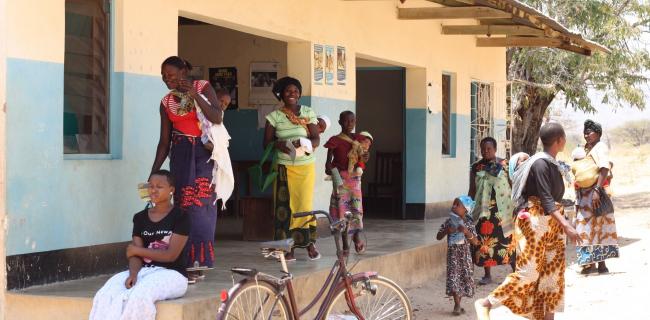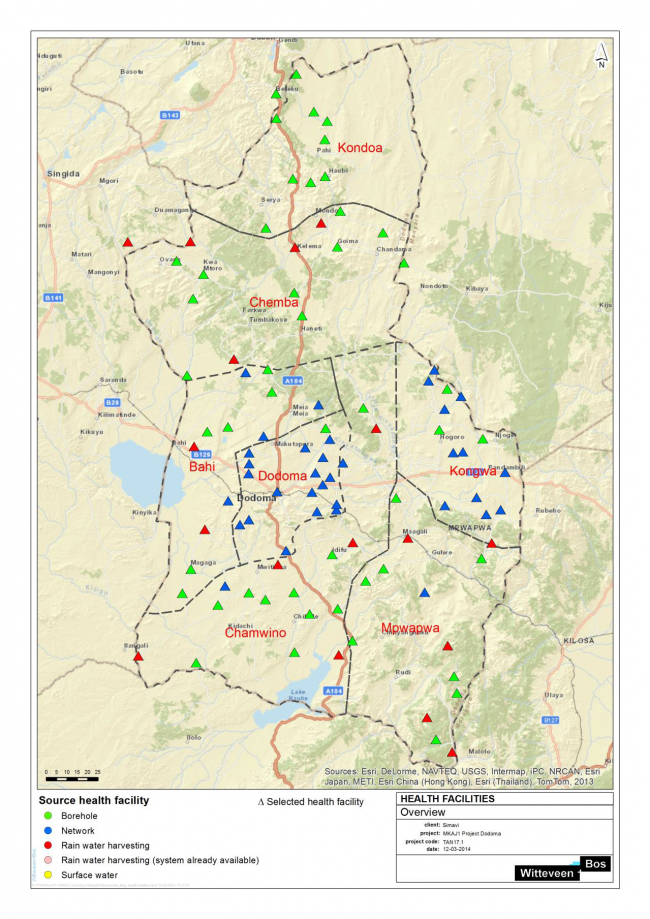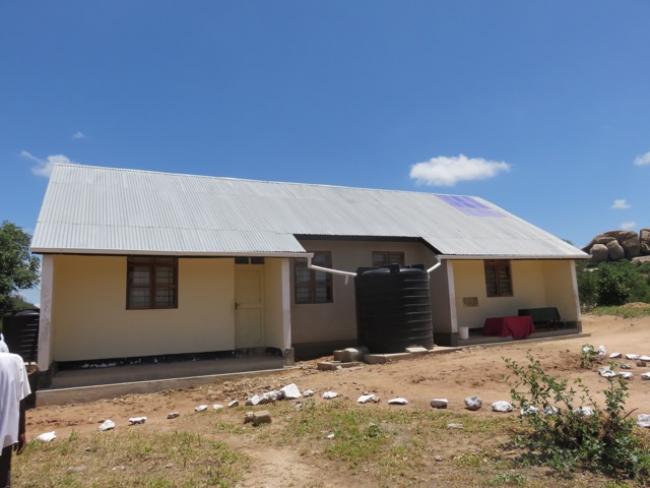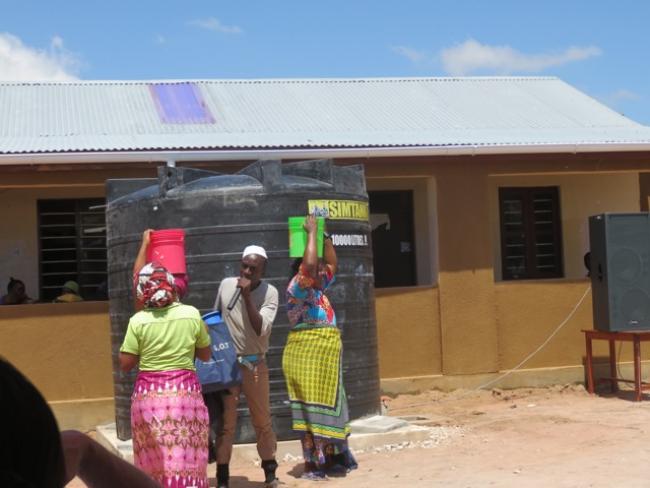Simavi is using integrated approaches in the MKAJI programme in Tanzania's Dodoma Region.
Published on: 14/10/2015

Water, Sanitation and Hygiene (WASH) is one of the important social determinants of health, and poor living and working conditions are a major contributor of communicable diseases. Access to water and sanitation in Tanzania is however poor, only 44% of the rural population has access to improved drinking water sources, while only 7% of the rural population have access to improved sanitation (JMP, 2014). Adequate WASH are essential components of providing basic health services. The provision of WASH in health care facilities serves to prevent infections and spread of disease, protect staff and patients, and uphold the dignity of marginalised populations including pregnant women and people with disabilities.
The current access to water and improved sanitation in Tanzania therefore poses a great health problem, especially at the primary health care level (dispensaries and health centres) where the majority of the population (almost 70%) seek health care services. The national figures show that almost two thirds of all health facilities lack a regular water supply (Water Sector Development Programme I & II). The regional or district level situation is not different from the national situation.
In the health facility setting, usually the surrounding environment is frequently contaminated with different kinds of pathogens. Surfaces often touched by health care workers during routine patient care such as supply cart handles, floors, infusion stands and bed rails are commonly contaminated and may be a source of (hospital-based infection) transmission. The hand washing behaviour by health care providers at critical times with plenty of water and soap and the cleaning of floor and surfaces are very important elements of infection prevention during routine patient care in a health facility.
Lack of water in the health facilities is one of the contributing factors to the low rate of delivery at the health facility as many pregnant women prefer to deliver their babies at home, where water is available. Lack of water in the health facilities adds also an additional burden to women, as they are the main care takers of the sick and are required to carry water with them when going to see their sick relatives who are hospitalized. In addition to carrying food women also carry 5 litres of water with them.
The consequences of poor WASH services in health care facilities are numerous as outlined by the WHO report on WASH in Health Care Facilities (2015). Health care associated infections affect hundreds of millions of patients every year, with 15% of patients estimated to develop one or more infections during a hospital stay (Allegranzi et al., 2011). The burden of infections is especially high in newborns. Sepsis and other severe infections are major killers estimated to cause 430,000 deaths annually. The risks associated with sepsis are 34 times greater in low resource settings (Oza et al., 2015). Lack of access to water and sanitation in health care facilities may discourage women from giving birth in these facilities or cause delays in care-seeking (Velleman et al., 2014). Conversely, improving WASH conditions can help establish trust in health services and encourage mothers to seek prenatal care and deliver in facilities rather than at home - important elements of the strategy to reduce maternal mortality (Russo et al., 2012).
According to the Regional Health Management Team (RHMT) the Dodoma region has 342 [1] functioning health facilities, both publicly and privately owned. Out of these, 114 are connected to piped water, 57 have boreholes and 171 have no water at all. The Dodoma region has a total population of 2.1 million (men 1,067,445; women 1,096,372) [2].
Upon request of the Local Government Authorities of the Dodoma Region, Simavi in partnership with SDC undertakes action to improve the quality of public health services provision by reducing the potential risk of transmission of communicable diseases and infections during routine patient care and treatment and improved maternity health care and service delivery by improving access to water, sanitation and hygiene.
Infrastructural works for WASH are complemented with capacity building activities in areas such as: water supply operation and maintenance, improved hygiene behaviour, and improved WASH governance; targeting selected health care staff and members of the surrounding rural communities.

The 5-year programme is implemented by Simavi in a consortium with Witteveen+Bos, a Dutch engineering and consultancy company, and three Tanzanian partners CBHCC, PATUTA and UFUNDIKO. These partners have a track record in monitoring of construction works, training on hygiene, social accountability and gender mainstreaming
The Maji kwa Afya ya Jamii (MKAJI) programme reaches into the seven districts of the Dodoma Region, an area as big as The Netherlands. Implementation finds its base on the analysis of the WASH situation in the public primary health facilities, carried out during the Inception Phase (June – December 2013).
An important aspect of the programme concerns awareness raising and triggering long lasting behavioural change to increase the knowledge and practice of health facility staff, patients and visitors on improved hygiene practices for reducing the transmission of communicable diseases and infections during routine patients’ care, while working with village health workers and traditional birth attendants aims to improve the quality of maternal and general health care delivery.

A costing for three standard solutions for upgrading the water supply and sanitation works at the health facilities was developed in the inception phase. The three standardised solutions include connection to existing water network, rehabilitation or construction of boreholes, and construction or rehabilitation of rain water harvesting. Furthermore, costing was done for the sanitation solutions.
As communities and their health facilities change over time, initial data on identified infrastructure solutions need to be checked and, when/where necessary, adjusted to the changes in the context. On the basis of field verification of data from inception phase the engineers of the programme adjust drawings, Bill of Quantity and tender documents for the construction of WASH infrastructure. Through a competitive transparent tendering process, local contractors were selected and contracted. The works include constructions for water supply (raiser platform for storage tanks, connection pipes to village network/install rainwater harvesting infrastructure), rehabilitation or construction of latrines, construction of a bathroom connected to the delivery room, a gravel pit for waste water and rehabilitation or construction of a placenta pit. So far works at 11 health facilities are finalised in 3 different districts and trainings on Operation & Maintenance of the WASH facilities jointly with trainings on water management and improving hygiene practices.
In the meantime MKAJI Programme also initiated regional coordination with other WASH stakeholders in the region, HPSS and UMATA, to inform each other on intervention areas and activities in Dodoma Region, harmonize interventions and avoid duplication of interventions and (last but not least) exchange best practices for joint learning. The 3 programmes pooled resources to support the celebration of Global Handwashing Day on the 15th of October with staff of health facilities and schools in Dodoma region.
Through this platform, and with support from the national coordinator for national sanitation campaign, the stakeholders reached out to the Regional Water and Sanitation Team of Dodoma aiming at facilitation of regional and district dialogue on WASH related policies. MKAJI, HPSS and UMATA programmes bring in relevant evidence on improving water, sanitation and hygiene practices that is valuable input for policy dialogue at district, regional and national level.

Water, Sanitation and Hygiene need to be addressed in an integrated way, combining hardware and software components, e.g. rehabilitating water supply infrastructure should include working at the same time on improving sanitation conditions as well as improving hygiene practices through behaviour change communication. While this is practiced in the MKAJI Programme with rehabilitation of water, sanitation and hygiene conditions at health facilities, the same approach should apply at construction of new Health Facilities, combining water supply and sanitation services by integrating hardware (construction works) with software components like training, coaching on improved sanitation and behavioural change communication to improve hygiene.
Social accountability mechanisms in water supply, sanitation and hygiene promotion contribute to improved WASH governance at various levels and should become a standard element of WASH service delivery interventions.
MKAJI shares quarterly progress reports with the Regional Health Office and relevant District Health Offices. However, the data on progress in WASH service delivery does not appear in Regional progress reports, resulting in under-reporting of WASH achievements at districts/regional level.
The Regional Water and Sanitation Team should have a coordinating role in monitoring WASH achievements at various levels through the proper reporting lines.
[1] This number has now increased to 407 as new health facilities have been established under the MMAM strategy.
[2] National Bureau of Statistics, 2010 projections.
At IRC we have strong opinions and we value honest and frank discussion, so you won't be surprised to hear that not all the opinions on this site represent our official policy.